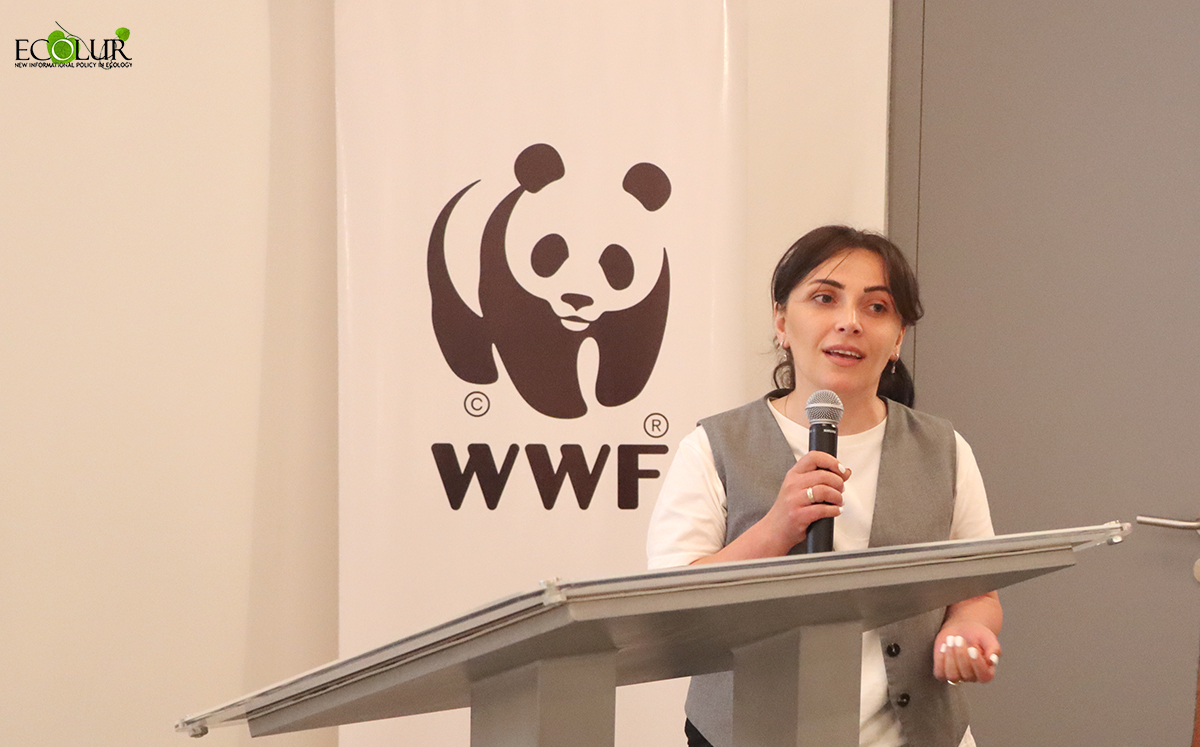


The meeting of beneficiaries of the "Living Landscapes for Market Development in Armenia" (LILA) project took place at COAF SMART Center in Debet Village, Lori Region on June 3, 2025.
Representatives from WWF-Armenia, Strategic Development Agency (SDA) NGO, EcoLur Informational NGO, partner organizations, tourism companies, as well as beneficiaries and representatives of local self-governing bodies from Tavush, Lori, Syunik and Vayots Dzor regions were present at the event.
In his welcoming remark Levon Aghasyan the Director of WWF-Armenia noted:
“The main goal of the project is to make investments in communities that contribute to sustainable development and job creation. It’s important that the work we’ve initiated is continuous and comes to a logical conclusion. That conclusion should be the achievement of communities with sustainable incomes."
Naire Yeritsyan from WWF-Armenia, the Coordinator of the LILA Project, presented the results of the environmental component. She emphasized that six Conservation agreements have been signed through the project with the communities of Sisian, Yeghegis, Tumanyan, Pambak, Ijevan, and Yeghegnadzor, bringing the total number of community- conserved areas in Armenia to nine, covering nearly 90,000 hectares. Currently, the Law on Specially Protected Areas of Nature is under revision, and the Guide for Establishing Community-conserved areas has been submitted to RA Ministry of Environment.
“Many amendments are under consideration within the Law on specially protected areas, which will prepare legal framework for our activities,” Yeritsyan noted.
Various measures have been implemented within the project, to improve energy efficiency and infrastructure. Solar photovoltaic systems have been installed on the roofs of municipal buildings in the villages of Dsegh, Yeghegnut, Debet, and Margahovit in Lori Region; Sevqar and Yenoqavan in Tavush Region; Vernashen and Gladzor in Vayots Dzor Region; and Shaghat in Syunik Region. A 40kW ground-mounted solar station has been installed in Shatin. Mobile hybrid solar units have been provided to the villages of Shatin, Hermon, Vernashen, and Shaghat. In Shaghat, a 300-liter solar water heater has been installed on the roof of the local kindergarten.
The project has also developed a climate action plan for six beneficiary forest enterprises and provided in-kind support to the Eco-patrol Service. In the field of sustainable pasture management, pasture management plans have been developed for 14 beneficiary villages, and 21 infrastructure units—such as livestock watering points, animal enclosures and field roads—have been constructed in 15 villages. Training sessions on pasture and forest management have increased participants’ awareness on climate change issues and sustainable use of natural resources.
Alla Ghazaryan, the Project Coordinator from SDA, presented results of the market development component. She noted that at least 300 farming households have increased their income through the sustainable use of natural resources. Moreover, at least 600 individuals—35% of them women—have found employment in the fields of sustainable tourism and hospitality. With the project’s support, more than 20 tourism businesses and 11 small supplier enterprises have been established, generating sustainable incomes by partnering with tour operators.
“At least 17,000 tourists have purchased sustainable and inclusive tourism packages and experiences offered by our partner tour operators. More than 10,000 tourists have visited the project’s target regions through these operators. Over 20,000 visitors have been hosted by businesses supported by the LILA project. In total, more than 600 jobs have been created in the target communities,” said Mrs. Ghazaryan.
Through the project’s assistance, partner tour operators had participated in international and reputable tourism expos.
Victoria Burnazyan, Deputy President of EcoLur Informational NGO, presented the activities carried out by the organization within the project. The organization’s main role was to ensure visibility of the project, establish and promote the network of Citizen journalists, organize Mediatours. As part of this effort, a platform called “Voice of Citizen Journalists” was launched, where over 300 posts, photo stories, and videos were shared within 1.5 years. Trainings on journalism and public engagement were organized for participants from 12 communities.
“The publications by citizen journalists on the platform reflect LILA project results, the impacts of climate change on their communities, biodiversity, tourism potential, socio-economic issues and daily life in the villages. In 2024, we organized a competition titled ‘Make the Community’s Voice Heard,’ where 12 citizen journalists received awards in 4 nominations,” Mrs. Burnazyan shared.
She also spoke about media tours organized to Vayots Dzor, Syunik, Tavush, and Lori Regions in May 2025, to showcase the results of the LILA project. Following her presentation, Burnazyan handed over memorable gifts to the most active contributors of "Voice of Citizen Journalists" platform: Mariam Yeganyan, Anush Sargsyan, Nare Ghazaryan, Gayane Kochinyan, Shahane Hambardzumyan, Mane Hakobyan, Siranush Avetisyan, and Lilit Iskandaryan. After the award ceremony, beneficiaries, local government representatives, and tourism organizations delivered speeches. Video clips and photo series showcasing the beneficiary communities were also presented.
"Living Landscapes for Market Development in Armenia" (LILA) project is funded by the Government of Switzerland through the Swiss Agency for Development and Cooperation (SDC) and is implemented by Caucasus and Armenia offices of the WWF, in partnership with the Strategic Development Agency NGO.




















June 06, 2025 at 12:33
